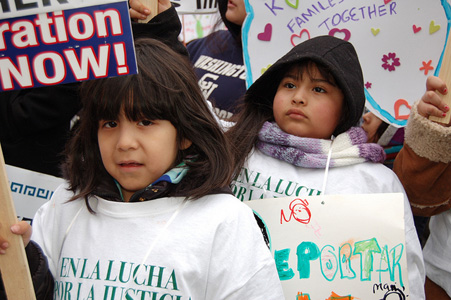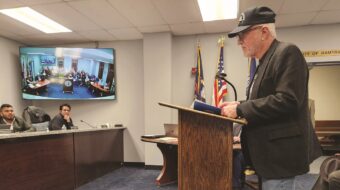
Last week, the bipartisan “Gang of Eight” in the U.S. Senate finally presented their long awaited immigration reform bill. The Border Security, Economic Opportunity and Immigration Modernization Act of 2013 (S.744) will soon be joined by a bill in the House of Representatives. Now comes the real fight, to pass a bill in each house, but also to modify the original drafts so as to fortify the positive elements and eliminate the dangerous and negative ones. S.744 includes some big advances and improvements over past bills, but also some real problems and even dangers.
Numerous groups are working out their point-by-point analyses of the Senate bill, which is more than 800 pages long. A useful summary has been posted online by the National Immigration Law Center; the present article takes this as its starting point.
A major positive accomplishment of this bill is to potentially legalize the vast majority of current undocumented immigrants in the United States, generally estimated at around 11 million, with 8 million or so in the work force. There are some very progressive new items in S.744 that have not been seen in other recent immigration reform legislation. For example, this bill would allow the return of many people who have already been deported and who have U.S. citizen children and/or spouses in the United States.
This is an important advance over previous legislation not only because it is humane, but also because a major reason people cross the border without papers is to be able to rejoin their U.S. families, and have no legal way to do so if they can’t get visas or have already been removed from the United States previously. This would go a long way to solving a major demand of the immigrants’ rights movement, which is that parents of U.S. citizen children should not be deported, and if deported, should be able to return to be with their families.
But there is a serious problem with the mechanism to be used to legalize the undocumented immigrants. A new status is created for them and their spouses and minor children, that of “Registered Provisional Immigrant” (RPI). This status would be reserved for previously undocumented immigrants who came to the United States before the last day of the year 2011 and who meet various other requirements including not having a serious crime record (no felonies and no more than three misdemeanors, among other things).
RPIs could live and work in the United States, but would not be guaranteed Permanent Legal Resident (PLR) status until they got through a 10-year probationary period (with shorter waits for DREAMers and agricultural workers). They would first be in the limbo status of RPIs for 6 years, then would have to apply for an extension, pay more fees and if approved, they would be RPI’s for another four years. After that, they could apply for PLR status, and then after 3 years (not the standard 5) could apply for U.S. citizenship by naturalization.
The trouble is that the 10-year RPI status is booby-trapped. First of all, to get it extended for the second period, RPIs would have to prove that their incomes were not below the official U.S. poverty rate at that time. Secondly, they would have to prove steady employment, with no hiatus of more than 60 days of being unemployed. Finally, they could not get any means tested government benefits during the time they were RPIs, or in their first five years as permanent legal residents. They would be required to purchase health insurance in the exchanges set up by the Affordable Care Act (Obamacare) but only with their own money; they would not be eligible for discounts or subsidies.
What would be the impact? At first glance, it would mean that quite a few undocumented immigrants would not be able to navigate this obstacle course: Many of them are under the poverty line as it is. Others would be knocked out of RPI status because of layoffs, factory closings and all sorts of things that might affect their employment. These are economic factors neither immigrant workers nor any other workers can control, but they would make the difference between being legalized and being deported for these workers and their families. And between the stiff fees and fines at each step of the way, and the non-access of the immigrants to government help programs, many may not make it.
And even if they are able to tough it out, the employment requirement gives their employers a powerful weapon to control worker demands for higher pay and better working conditions. One of the worst things about the current system of low paid, undocumented labor in the United States is that it undercuts workplace struggles, including unionization drives and strikes. Currently, even though many undocumented immigrant workers support union demands and would certainly like better pay, their participation in the struggle is limited because they are vulnerable to their employers’ threats to get them deported, and because if they lose their jobs, it is even harder for them than for U.S. citizen or documented immigrants find new ones. This creates a situation of brutal super-exploitation of undocumented immigrant labor. The employment requirement of S.744, if not changed, would perpetuate this situation for 10 years or more.
There are other negative factors in the bill, such as new repressive measures like universal use of E-verify, plus some extremely positive ones, such as the best version of the DREAM Act we have seen so far. These will be dealt with in other articles to follow.
People’s World has published “Immigration: Myths and Facts,” which can be downloaded here, to help the effort to win a reform law that puts the best of American values, family, workers’ and civil rights first. https://www.peoplesworld.org/immigration-myths-vs-facts-available-for-download/
Photo: Children march in Chicago, March 26, to keep immigrant families together and for immigration reform (PW/Winona Albano Bachtell).












Comments